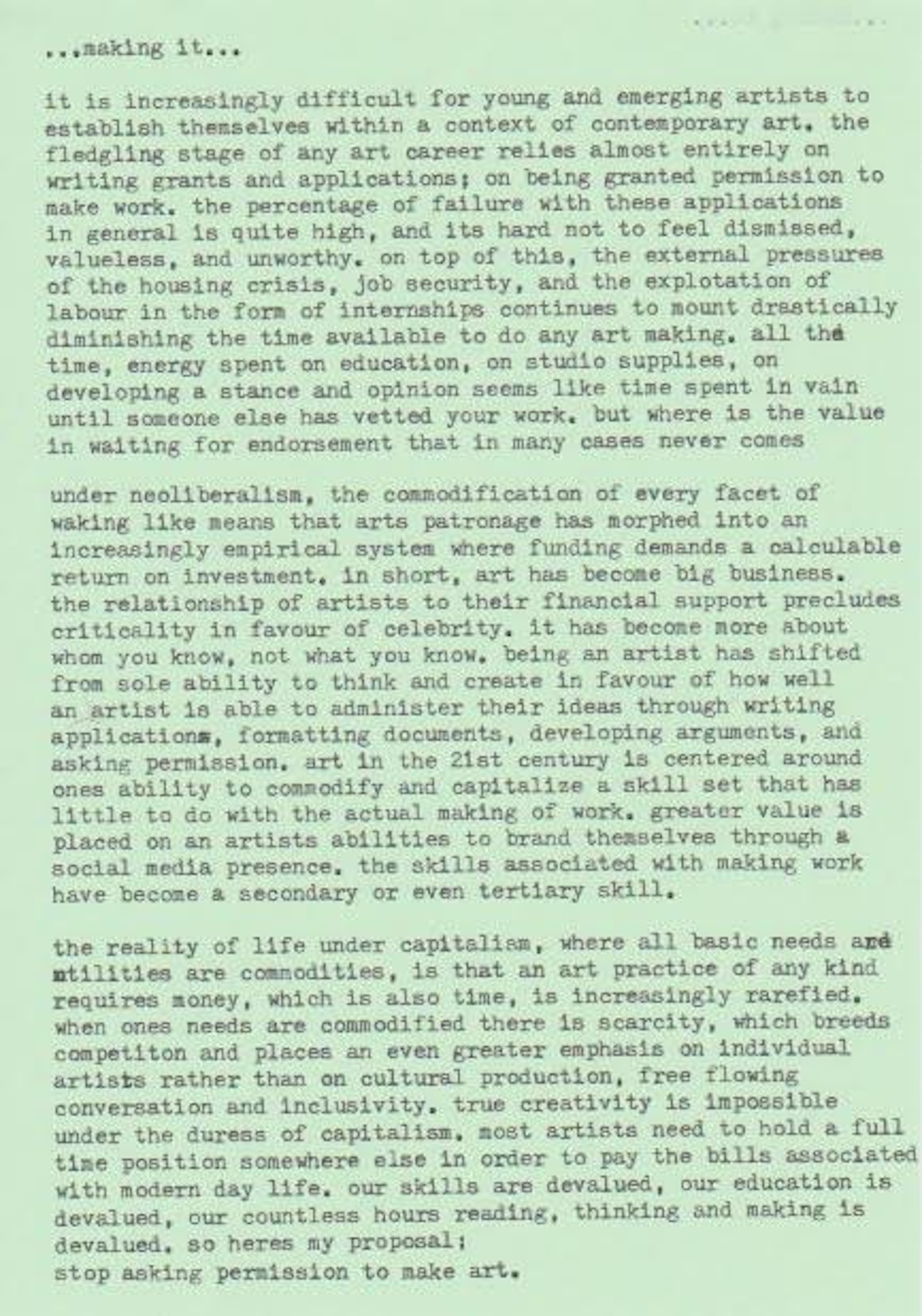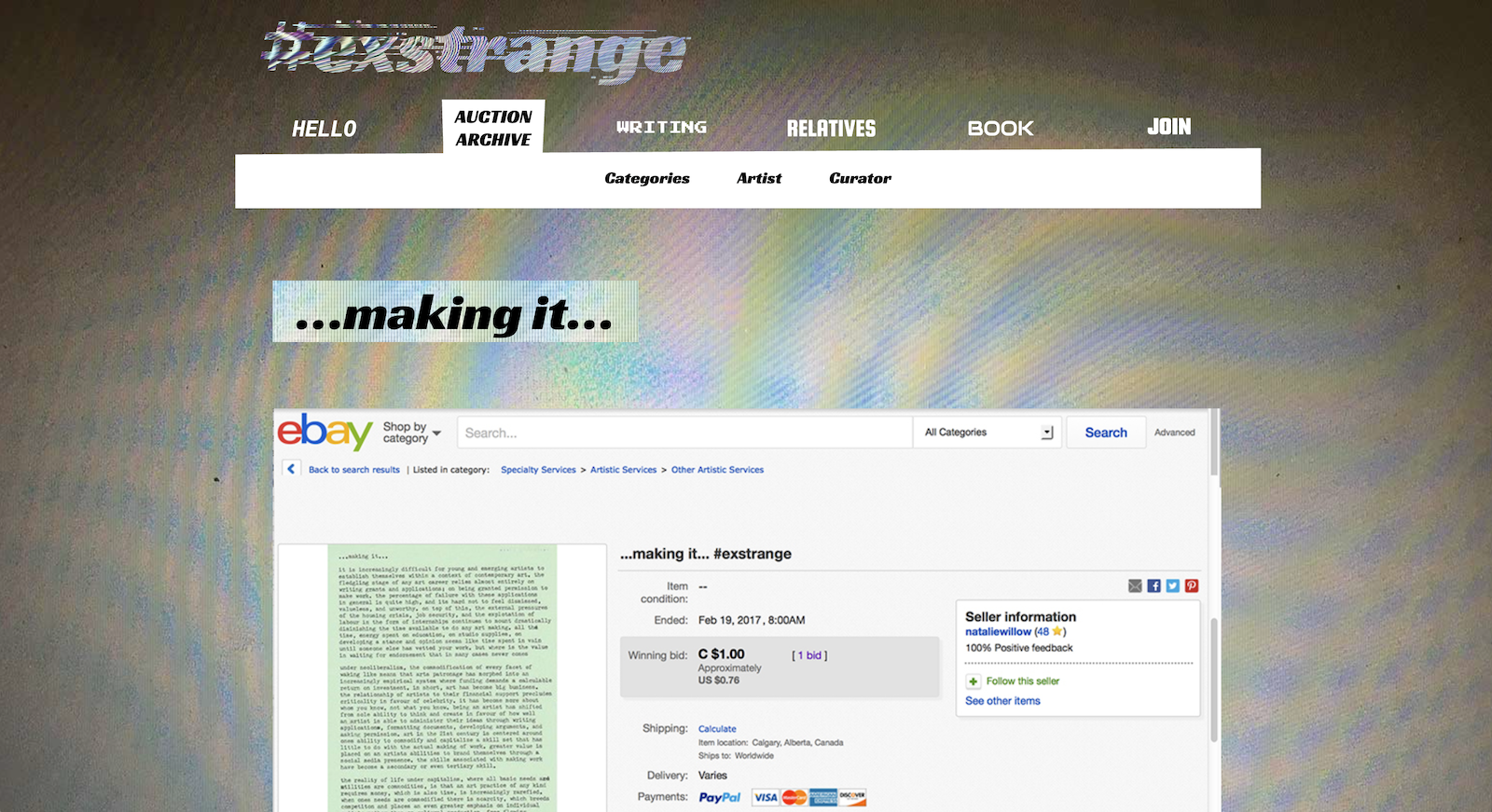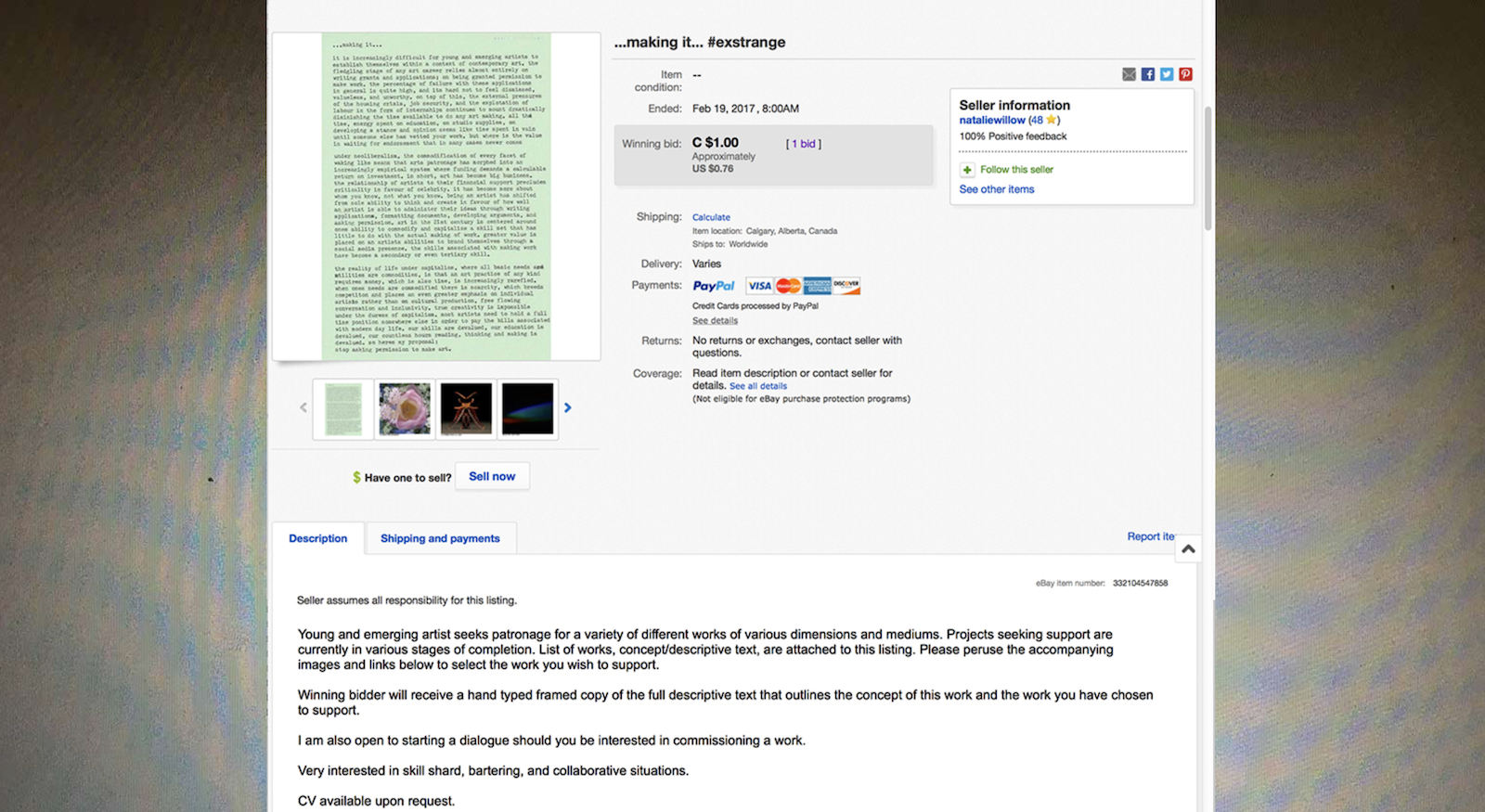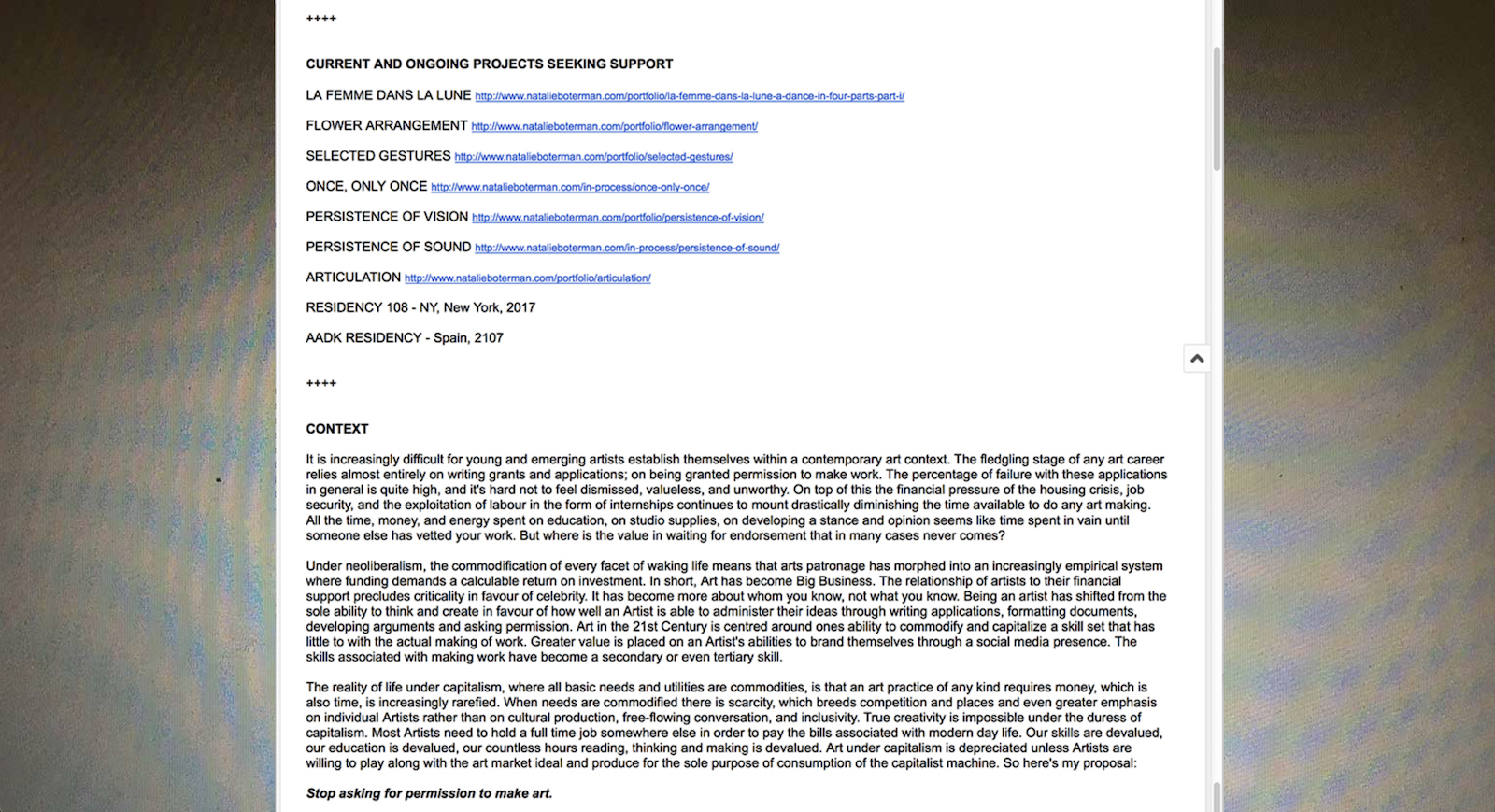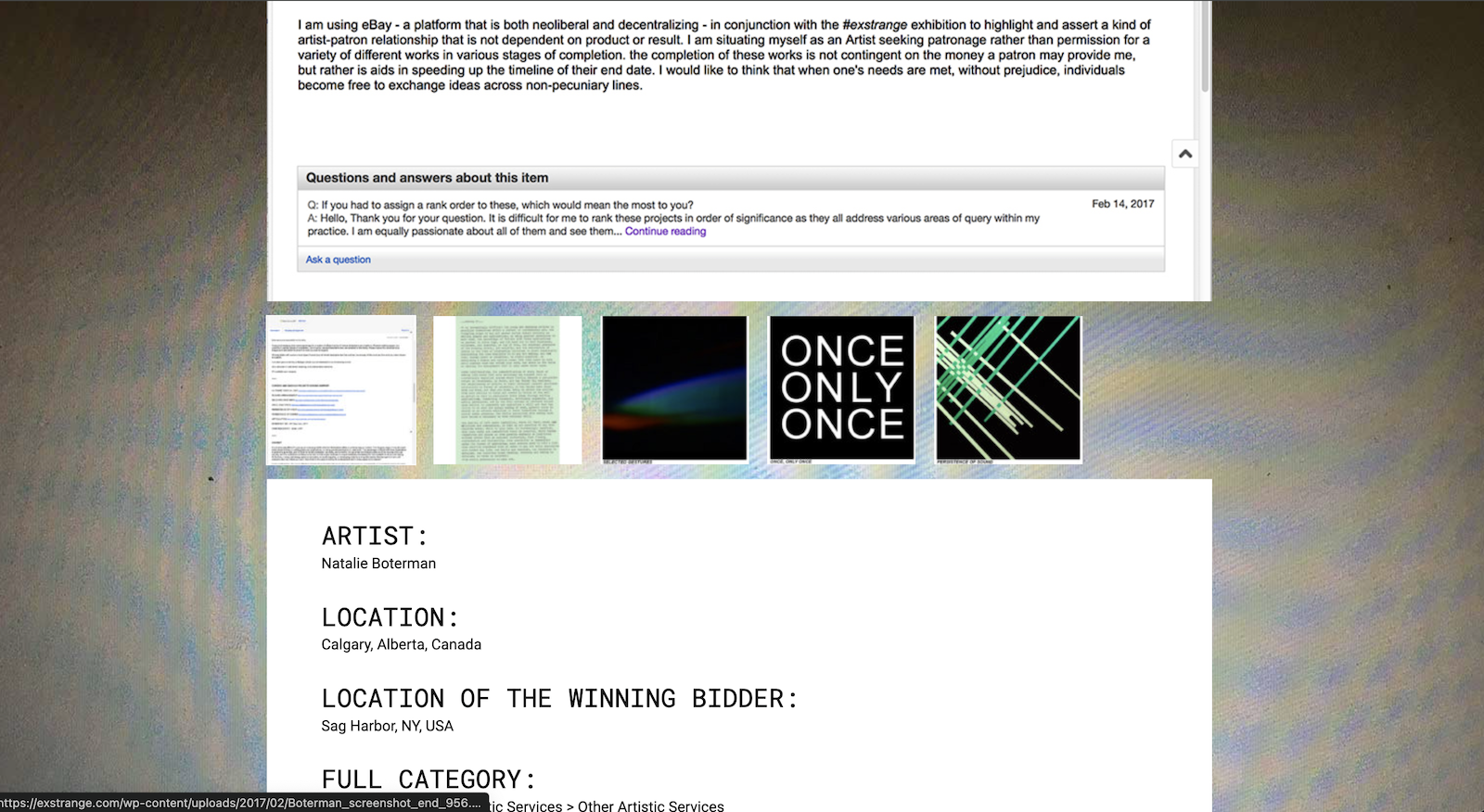. . . MAKING IT . . .
#exstrange project by curators Marialaura Ghidini and Rebekah Modrak
project curated by Peter Dykhuis
2017
https://exstrange.com/auctions/making-it
It is increasingly difficult for young and emerging artists to establish themselves within a contemporary art context. The fledgling stage of any art career relies almost entirely on writing grants and applications; on being granted permission to make work. The percentage of failure with these applications in general is quite high, and it’s hard not to feel dismissed, valueless, and unworthy. On top of this, the external financial pressures of the housing crisis, job security, and the exploitation of labour in the form of internships continues to mount drastically diminishing the time available to do any art making. All the time, money, and energy spent on education, on studio supplies, on developing a stance and opinion seems like time spent in vain until someone else has vetted your work. But where is the value in waiting for endorsement that in many cases never comes?
Under neoliberalism, the commodification of every facet of waking life means that arts patronage has morphed into an increasingly empirical system where funding demands a calculable return on investment. In short, Art has become Big Business. The relationship of artists to their financial support precludes criticality in favour of celebrity. It has become more about whom you know, not what you know. Being an Artist has shifted from sole ability to think and create in favour of how well an Artist is able to administer their ideas through writing applications, formatting documents, developing arguments and asking permission. Art in the 21st Century is centered around ones ability to commodify and capitalize a skill set that has little to with the actual making of work. Greater value is placed on an Artists abilities to brand themselves through a social media presence. The skills associated with making work have become a secondary or even tertiary skill.
The reality of life under capitalism, where all basic needs and utilities are commodities, is that an art practice of any kind requires money, which is also time, is increasingly rarefied. When needs are commodified there is scarcity, which breeds competition and places an even greater emphasis on individual Artists rather than on cultural production, free-flowing conversation, and inclusivity. True creativity is impossible under the duress of capitalism. Most Artists need to hold a full time job somewhere else in order to pay the bills associated with modern day life. Our skills are devalued, our education is devalued, our countless hours reading, thinking and making is devalued. Art under capitalism is depreciated unless Artists are willing to play along with the art market ideal and produce work for the sole purpose of consumption of the capitalist machine. So here’s my proposal:
Stop asking for permission to make art.
I am using eBay – a platform that is both neoliberal and decentralizing – in conjunction with the #exstrange exhibition to highlight and assert a kind of artist-patron relationship that is not dependent on product or result. I am situating myself as an Artist seeking patronage rather than permission for a variety of different works in various stages of completion. The completion of these works is not contingent on the money a patron may provide me, but rather it aids in speeding up the timeline of their end date. I would like to think that when one’s needs are met, without prejudice, individuals become free to exchange ideas across non-pecuniary lines.
ABOUT #exstrange
#exstrange was a live exhibition project that used the online marketplace eBay as a site of curatorial operation, artistic production and cultural exchange; a project that operated within the geographical boundaries enabled by the commercial platform the curators, Marialaura Ghidini and Rebekah Modrak, appropriated—the various ‘national’ eBay sites.
The exhibition presented a series of artworks-as-auctions that artists and designers created for eBay by using the entire listing as material constituting the artwork—descriptive text, images, pricing, and categories. The categories (such as Business & Industry, Collectibles, Consumer Electronics, Health & Beauty, Real Estate, and Warranty Services) also became a tool to reach particular and diverse communities of interest beyond physical and socio-cultural barriers. Live for 7 days only, each auction was launched and maintained by its creator so that the interactions with the bidders (viewers) and their comments were incorporated in real time into the work on eBay. In this sense, an #exstrange artwork would not exist before being an auction and would only be complete within the context of eBay.
The curators created #exstrange to explore collective strategies of production and communication online; strategies that they thought would enable more personal and meaningful encounters between auctions and the passers-by of the e-marketplace, and between artists and audiences. At its core, #exstrange sought responses to the driving question: “What forms of encounters and types of relationships can take place in the realm of e-commerce beyond the seller-to- buyer transaction, the fundraiser-to-backer association, or the peer-to-peer swap?”
#exstrange began with the curators’ invitation to 21 artists to launch a 7-day artwork-as-auction on eBay. This was followed by a series of interventions by 11 guest curators based across the world who, in turn, invited three artists each according to their own interpretation of the project. Other participants joined along the way through the open call or by coming across the project. Connected by the tag #exstrange in the listing title, the works could be found in that vast archive of commodities online that is eBay, while this website aggregated them in real time on the home page and now functions as an archive. 102 artworks-as-auctions were created during #exstrange, and 91 artists, designers, collectives, researchers, and also students participated in the project.
#exstrange launched on the 15 January 2017, and ended on the 13 April 2017, with the last auction posted on the 8 April.
